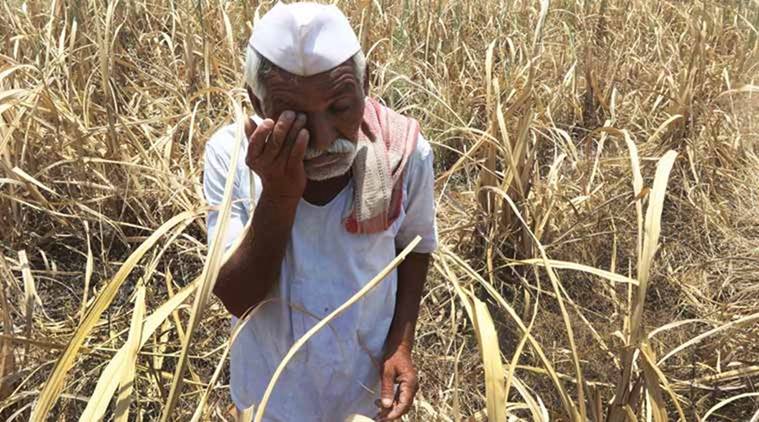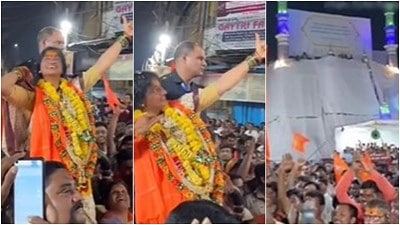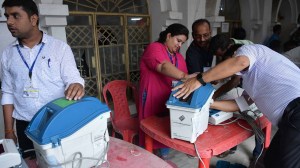- India
- International
Maharashtra mental health plan holds hands through rural distress
Under the Prerana mental health service scheme, which started in 2016, 46,542 farmers have been counselled in four years, and 11,304 hospitalised due to severe mental breakdown.
 The Health Department has been running a scheme in 14 drought-hit districts including Latur, above, since 2016. (File Photo)
The Health Department has been running a scheme in 14 drought-hit districts including Latur, above, since 2016. (File Photo)
AS RURAL distress emerges as one of the issues in the coming Maharashtra elections, figures from a state Health Department scheme show that more than 45,000 farmers in the state’s 14 drought-prone districts have been diagnosed with depression in the past four years, of whom around one-fourth had to be hospitalised.
Under the Prerana mental health service scheme, which started in 2016, 46,542 farmers have been counselled in four years, and 11,304 hospitalised due to severe mental breakdown.
In a report submitted in the Assembly in June, the government had acknowledged 12,021 farmers suicides in the state between 2015-18, and over 600 this year alone.
The 14 districts covered under the Prerana scheme are Aurangabad, Beed, Jalna, Hingoli, Nanded, Latur, Osmanabad, Parbhani, Akola, Amravati, Buldhana, Washim, Yavatmal and Wardha, spread across Marathwada and Vidarbha regions.
Dr Sadhana Tayade, Director of Health Services, Maharashtra, told The Sunday Express that they had devised a public health questionnaire with 12 points on the checklist, as per guidelines of the WHO, and trained ASHA workers to conduct the survey. Prakash Muperi of the state’s Mental Health Cell said that in 2016-17, the survey was conducted across 77 lakh homes and “we were able to diagnose 10,213 farmers and family members with depression”. In 2017-18, approximately 78 lakh homes were visited by ASHA workers where they were able to narrow down 8,645 people with depression. In 2018-19, 83 lakh homes were surveyed and 19,923 farmers diagnosed with mild to severe depression.

Among the 2018-19 numbers, 14,006 farmers were found with mild depression symptoms (prolonged periods of sadness, unable to take part in any pleasurable activity), 4,806 with moderate depression (loss of sleep and appetite and feelings of hopelessness and helplessness), and at least 1,111 with severe depression (suicidal thoughts, nihilistic delusions, apart from prolonged fatigue, somatic complaints and improper hygiene habits).
This year, from April till August, around 13 lakh homes were surveyed and 7,761 people treated for depression — mild to moderate — on an OPD basis.
Radha Awachar, an ASHA worker in Mehkar tehsil in Buldhana district, said they kept visiting the homes allotted to them to get acquainted with the behaviour pattern of family members. “Not everyone opens up and so we ask indirect questions like how often they stay awake at night, skip meals etc. Our close connect with villages helps us identify the persons who may be having mental health issues.”
Dr Swati Sonone, a psychiatrist with the Prerana project, who is also in-charge of the Amravati district’s mental health programme, said the questionnaire gives them an indication of the severity of the problem. While those with mild depression are referred to primary health centres, to receive counselling from a medical officer, those moderately depressed are sent to rural hospitals for both medication and counselling, while the severe cases are handled at district-level hospitals.
Each district has a designated team, including a psychiatrist, clinical psychologist, ASHA workers, community health workers and clerical staff, that assesses patients with depression on specific days in the week, said Dr Sonone.
While health officials admitted that it was too early to measure impact, in some districts, the interventions may have helped check suicides. Muperi gave the example of Osmanabad district, where the programme was launched. “There were 114 farmer deaths due to suicide in 2016-17, which came down to 41 in 2018-19. In Beed district too, from 220 deaths due to suicide in 2016-17, numbers came down to 150 in 2018-19.”
Apart from this scheme, the government has been running a mental health services helpline, reachable on number 104, since 2015. Niraja Banker, Senior Manager, Operations, at the health advice call centre, said, that since 2015, they had counselled 6,811 farmers. “Over the last three to four years we have been able to prevent at least 255 farmers from committing suicide,” she said.
Banker said a majority of the calls they got were related to anxiety, depression and sexual and reproductive health, and the highest number of calls were from Wardha, Nanded, Yavatmal, Beed and remote areas of Pune district. Adding that the counsellors also advise farmers on alternative modes of employment, she said, “Their concerns relate to repayment of loans, children’s future, anxiety… It is a virtual handholding session and they are given enough time to unburden themselves.”
Apr 19: Latest News
- 01
- 02
- 03
- 04
- 05






































